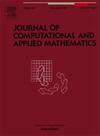Global accelerated Hermitian and skew–Hermitian splitting preconditioner for the solution of discrete Stokes problems
IF 2.1
2区 数学
Q1 MATHEMATICS, APPLIED
Journal of Computational and Applied Mathematics
Pub Date : 2025-03-10
DOI:10.1016/j.cam.2025.116620
引用次数: 0
Abstract
In fluid mechanics, numerous applications necessitate solving a sequence of linear systems. These systems typically arise from discretizing the Stokes equations using mixed-finite element methods. The matrices that result from this process often exhibit a saddle point structure, which makes the iterative solution of preconditioned linear systems challenging. To effectively solve the large scale and ill-conditioned linear systems, it is necessary to implement efficient linear solvers. We present a global approach, specifically the preconditioned global conjugate gradient (PGCG), aimed at enhancing the performance of preconditioned Hermitian and skew–Hermitian splitting preconditioner and accelerated Hermitian and skew–Hermitian splitting preconditioner . The new preconditioners can be utilized to expedite the convergence of the generalized minimal residual (GMRES) method. We evaluate the effectiveness of the preconditioned iterative methods by considering the Central Processing Unit () times and numbers of the GMRES iterations. The numerical results indicate that incorporating GCG method improves the performance of the preconditioners and .
离散Stokes问题解的全局加速厄米和偏厄米分裂预条件
在流体力学中,许多应用都需要求解一系列线性系统。这些系统通常是由使用混合有限元方法离散Stokes方程引起的。由这一过程产生的矩阵通常呈现鞍点结构,这使得预条件线性系统的迭代解具有挑战性。为了有效地求解大型病态线性系统,需要实现高效的线性解算器。我们提出了一种全局方法,特别是预条件全局共轭梯度(PGCG),旨在提高预条件厄米和斜厄米分裂预条件(PPHSS)和加速厄米和斜厄米分裂预条件(PAHSS)的性能。利用这些预条件可以加快广义最小残差法的收敛速度。我们通过考虑中央处理器(CPU)的次数和PGMRES迭代的次数来评估预条件迭代方法的有效性。数值结果表明,采用PGCG方法可以改善PPHSS和PAHSS预调节器的性能。
本文章由计算机程序翻译,如有差异,请以英文原文为准。
求助全文
约1分钟内获得全文
求助全文
来源期刊
CiteScore
5.40
自引率
4.20%
发文量
437
审稿时长
3.0 months
期刊介绍:
The Journal of Computational and Applied Mathematics publishes original papers of high scientific value in all areas of computational and applied mathematics. The main interest of the Journal is in papers that describe and analyze new computational techniques for solving scientific or engineering problems. Also the improved analysis, including the effectiveness and applicability, of existing methods and algorithms is of importance. The computational efficiency (e.g. the convergence, stability, accuracy, ...) should be proved and illustrated by nontrivial numerical examples. Papers describing only variants of existing methods, without adding significant new computational properties are not of interest.
The audience consists of: applied mathematicians, numerical analysts, computational scientists and engineers.

 求助内容:
求助内容: 应助结果提醒方式:
应助结果提醒方式:


